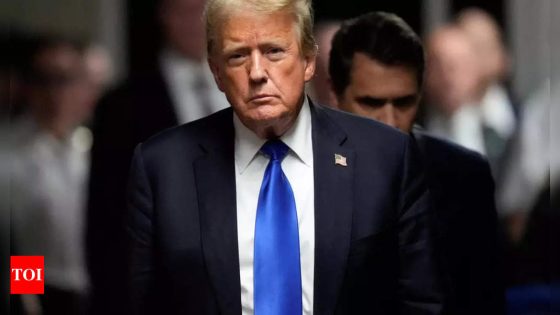WASHINGTON: The US Supreme Court on Monday ruled that former president Donald Trump is entitled to “absolute” immunity for clearly official acts, implicitly overturning the principle that no person is above the law and paving way for an imperial presidency in America.
By a 6-3 majority, conservatives on the SC bench, three of them appointed by Trump, said that broad immunity for official conduct is needed to protect “an energetic, independent executive”.
The three liberal justices on the bench dissented, saying the decision was gravely misguided and it “effectively creates a law-free zone around the president, upsetting the status quo that has existed since the founding”.
Although Chief Justice John Roberts, writing for the majority, argued that the president “enjoys no immunity for his unofficial acts, and not everything the president does is official… (and) the president is not above the law”, liberal Justice Sonia Sotomayor in her dissent for the minority said the broad immunity “reshapes the institution of the presidency” and “makes a mockery of the principle” that no man is above the law.
The ruling sends back to lower courts the election interference case against Trump and will almost certainly help run the clock down to the 2024 elections.
The ruling still leaves it to the trial court to determine what Trump did or instigated constitutes official or unofficial acts, but the process will most certainly take months, effectively letting the voters decide the matter.
If Trump wins on Nov 5, he can simply quash the case when he assumes office, by either ordering the justice department to drop the charges against him, or pardon himself.
If Biden wins, he too, should he choose to do so, ride into an imperial presidency, forever changing the nature of politics in the self-professed “greatest democracy in the world”.
The Supreme Court conservatives tried to finesse the ruling saying a former president has absolute immunity for his core constitutional powers — and is entitled to a presumption of immunity for his official acts, but lacks immunity for unofficial acts.
“No court has thus far considered how to distinguish between official and unofficial acts,” the conservative majority wrote, while cautioning Trump against asserting “a far broader immunity than the limited one we have recognised”.
But Trump was already gloating over the ruling, posting “BIG WIN FOR OUR CONSTITUTION AND DEMOCRACY. PROUD TO BE AN AMERICAN!” on Truth Social.
Democratic leaders raged at the ruling, with New York Senator Chuck Schumer calling it a “disgraceful decision by the MAGA SCOTUS—which is comprised of 3 justices appointed by Trump himself.”
Fundamentally, what the conservative justices ruled upheld Richard Nixon’s claim in 1974 during the Watergate scandal: “When the president does it, that means that it is not illegal.” Nixon would not have had to resign under current SC ruling even though he tried to cheat his way into a second term.
By a 6-3 majority, conservatives on the SC bench, three of them appointed by Trump, said that broad immunity for official conduct is needed to protect “an energetic, independent executive”.
The three liberal justices on the bench dissented, saying the decision was gravely misguided and it “effectively creates a law-free zone around the president, upsetting the status quo that has existed since the founding”.
Although Chief Justice John Roberts, writing for the majority, argued that the president “enjoys no immunity for his unofficial acts, and not everything the president does is official… (and) the president is not above the law”, liberal Justice Sonia Sotomayor in her dissent for the minority said the broad immunity “reshapes the institution of the presidency” and “makes a mockery of the principle” that no man is above the law.
The ruling sends back to lower courts the election interference case against Trump and will almost certainly help run the clock down to the 2024 elections.
The ruling still leaves it to the trial court to determine what Trump did or instigated constitutes official or unofficial acts, but the process will most certainly take months, effectively letting the voters decide the matter.
If Trump wins on Nov 5, he can simply quash the case when he assumes office, by either ordering the justice department to drop the charges against him, or pardon himself.
If Biden wins, he too, should he choose to do so, ride into an imperial presidency, forever changing the nature of politics in the self-professed “greatest democracy in the world”.
The Supreme Court conservatives tried to finesse the ruling saying a former president has absolute immunity for his core constitutional powers — and is entitled to a presumption of immunity for his official acts, but lacks immunity for unofficial acts.
“No court has thus far considered how to distinguish between official and unofficial acts,” the conservative majority wrote, while cautioning Trump against asserting “a far broader immunity than the limited one we have recognised”.
But Trump was already gloating over the ruling, posting “BIG WIN FOR OUR CONSTITUTION AND DEMOCRACY. PROUD TO BE AN AMERICAN!” on Truth Social.
Democratic leaders raged at the ruling, with New York Senator Chuck Schumer calling it a “disgraceful decision by the MAGA SCOTUS—which is comprised of 3 justices appointed by Trump himself.”
Fundamentally, what the conservative justices ruled upheld Richard Nixon’s claim in 1974 during the Watergate scandal: “When the president does it, that means that it is not illegal.” Nixon would not have had to resign under current SC ruling even though he tried to cheat his way into a second term.
Source Agencies




